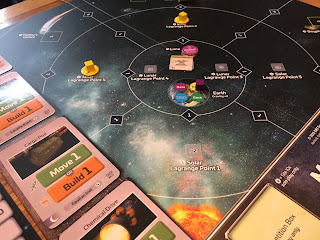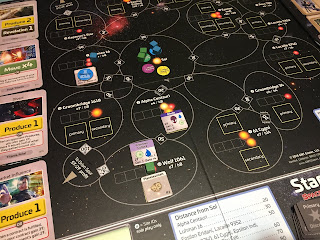the end of SpaceCorp
In the game you head out into the firmament to explore, build bases, and make money. Really, that is the nub of it, as on some planets what you find there can be rinsed for cash (they have a production value) and others can't. But you still want to build bases there, for reasons that will hopefully become clear.
the start of SpaceCorp
Despite SpaceCorp enormous scope thematically and otherwise (big distances; lots of boards) the mechanics of it are simple: on your turn, take a single action. The actions are largely self-explanatory: move your ship, explore a planet, build a base, run production on bases (for cash), research for more cards. More cards is always good, because everything you want to do is facilitated by them. Cards played are gone forever, but there's a way to make sure you have some kind of feeble permanent economy in place by using infrastructure: these cards are face-up in front of you and can always be used, without being used-up. The minor catch is that any cards in your infrastructure can also be accessed by any other player as well.
Infrastructure: 2 Research; 5 Move
Also on your infrastructure are two evolving sciences - of sorts - in genetics and revelations. Your culture's progress on these front is represented by cubes travelling in circles - every revolution rewards you with a genetic advancement, or revolutionary breakthrough. These combine with, and improve, your infrastructure. Again, despite the big words, they're all pretty straightforward.
And actually, as we leave Earth, these juicy advancements are unavailable anyway, as they are hidden in an alternate dimension (the other side of the board). Mysterious...
Early doors
But what's the point of it all?
As much as the exploring and producing can get you cash, the bigger goal is the contracts: these are on a separate 'business' board, and are basically objectives: first to build a certain amount of bases, first to produce, first to upgrade three advanced cards, and so on. If the tactics of SpaceCorp is the turn-by-turn move/explore/build, the strategy is making sure they align with at least one of the contracts. And that's where the interaction in the game lies, as much as the borrowing of each other's infrastructure: nobody can be sure who has what cards in their hands, and so there's a hidden-knowledge element as to how close anyone is to completing a contract: once complete, it's done, and that reward can't be claimed any more.
contracts
But wait! We've only just started. We've left Earth and made it - possibly - as far as Mars, and discovered maybe some water and a volcano or two. We've built research bases (get cards!) refineries (more production) and spaceports (travel faster!) amongst other things, but greater things lie ahead. When six of seven contracts are completed (or the cards run out) this age comes to an end, and the 'Mariners' board flips over revealing those lovely breakthroughs and advancements. And we now move onto another board - Planeteers.
Look what we found
This plays out in much the same way, albeit with those additional tools being added to your armoury, there's a sense of momentum building into how much you can do with a single action. And momentum is needed, as the distances travelled are beginning to get much greater, and building (which has a cost) isn't quite so simple either. Once you get beyond Jupiter there's radiation to consider - ignoring it can be expensive - and there's a sense that this game is turning from an explore and build experience into something more akin to a race. Hang around the asteroid belt and ignore the irradiated Ganymede if you like, but some of the juicier contracts encourage you further afield, until you're all the way out at the Oort Cloud, and on the verge of leaving our solar system entirely...
Which you do, because when this age ends (contracts done/cards run out, as before) there's a third board - Starfarers - which takes us out into the great beyond.
Starfarers
Here the basic tenets of the previous boards change a little, and a new action becomes available: building colonies. Movement values, as you might expect, become huge out here - but the cards for this age bring in new sciences that allow speed of light travel, or in card terms, multiplication. Arriving at a star system doesn't instantly allow exploration or building either, you have to kind of skid to a halt first. And you may find Aliens out here too: not warring types exactly, but scary enough to send your crew scuttling back home with their space nappies full.
It's the colony action though that completes the metamorphosis from gentle cosmos-discovery into bunfight: some colonies score points off other players, and all colonies score points at the game's end, which comes up faster than you think considering the huge deck of cards Starfarers has. In my play-through Green led the scoring pretty much throughout, and built three colonies to Blue's two for a whopping eight profit. But Blue won anyway courtesy of hitting the right contracts and spending their last three turns simply running production, as Green realized they couldn't get their second ship to the next great beyond (which is so far away it has no board, just 5T profit).
final scores - probably fairly abysmal ones
Last night I was in two minds about SpaceCorp. I really enjoyed playing it but when it finished there was a slight feeling that something was missing - it's a '3X' game, and without the 'exterminate' I wasn't totally sure there was enough there to make up for it. But I don't think it ever set out to be anything other that what it is - a story of travelling out into the cosmos and seeing what you find. And for the games I'd compare it to, it's more accessible than High Frontier, less brutally mathematical than Leaving Earth and just more fun than the bone-dry Kepler 3042. Although the board-flipping could be viewed as gimmicky, it does help give the sense you are moving further and further afield: the second and third boards introducing new elements prevent the feeling that you're just playing the same game three times.
And I love a game that tells a story, and especially so when it moves so fast - and SpaceCorp definitely ticks both those boxes. (Side note: there are rules to play just two or even a single board, but I think it would lose something in the process).









This sounds like fun Sam - I'm definitely up for a crack at it soon . . .
ReplyDeleteMe too. Calls for its own soundtrack and maybe we come dressed in space suits?
ReplyDelete